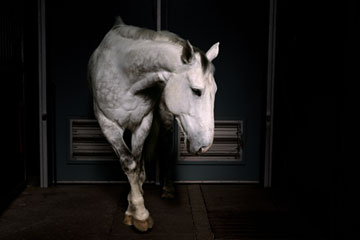
Horses can lapse into apparent depression when they lose a companion.
(6 of 6)
"Crows form lifelong pair bonds and might be mated for 20 years," he says. "When one dies, we've seen the survivor just standing above it looking at it." Killing a mate to run such an experiment is outside the bounds of decency and ethics. But anesthetizing one to simulate death, conducting the test and then reviving and releasing them both is something Marzluff would consider. "As stressful as that would be, it might be worth it to determine if the animals are experiencing what we do," he says. (The crows, surely, might differ.)
Is It the Real Deal?
Compelling as the lab work and field observations are, even advocates of animal-grief theory are wary about concluding too much. King questions whether bonobos or any other monkeys really do grieve, despite what the GC traces suggest. Yes, female baboons may carry dead babies for extended periods, but they have also been seen mating at the same time--hardly consistent with paralyzing grief. "Could this be natural selection pressing her not to grieve openly because it would affect her status, or was she really feeling nothing?" King asks. "I can't say."
The behavior of baboon babies may be less clear than it seems too. They have been observed standing over their dead mothers, rocking and crying, which sure looks like grief but could also be mere hunger. When Mom dies, the milk source is cut off, and lack of food can make a baby not just hungry but also cold, which it addresses by rocking.
Crows may indeed be mobbing a corpse to pay respects, or they may simply be trying to learn what killed it so they won't wind up the same way. And as for covering the body with grass or twigs? In many species, the same death odor that baby-carrying primates ignore triggers disposal behaviors, which protect survivors from remains that could be diseased. Cats apparently searching from room to room for a dead companion may just be trying to get used to a new routine and stake out territory in a new way. Even the legendary Hachiko might have been exhibiting a love for nothing more than a routine, making a daily trip to the train station because, well, that's the way it's always been done.
Yet something rebels at so reductive a view. Animals are not insensate--less sensate than us, certainly, but able to bond and romp and care and suffer in their own particular ways. Our ability to feel, including our ability to grieve, extends far into the emotional ultraviolet--a spectrum that is surely invisible to animals. But suppose they feel only in the visible spectrum--suppose they feel only in black and white? A lesser, blunter, briefer grief is not the same as peace or joy. Grieving profoundly, King argues, is the price humans pay for caring profoundly. It's not too much to suggest that the same equation, albeit on a lesser scale, has to balance for animals too.
